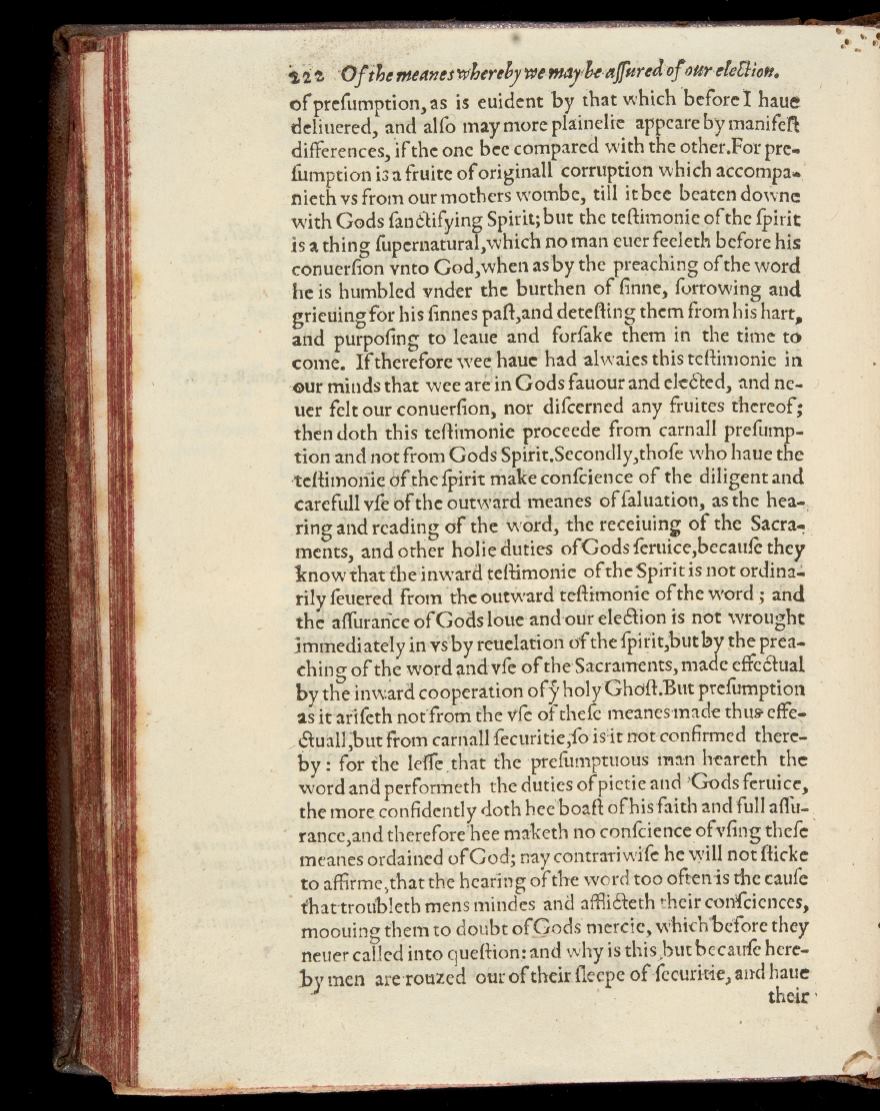

t2t
Ofthe
meanes
whereby
we
!maybeoffHredofnureloítiots.
of
prefumption,
as
is
euident
by that
which before
I
haue
tieliuered,
and alto may more plainelie appcarebymanifef{
differences,
ifthe
one bec compared with the other.For pre-
fumption
is
a fruite
oforiginall
corruption
which
accompa.
nieth
vs
from our
mothers
wornbe, till it bee
beaten downe
with Gods
fan
elifying
Spirit;
but
the
teaiinonie
ofthe
fpirit
is
a
thing
fupernatural,which noman
euer feeleth before
his
conuerfionvnto
God,when as
by the
preaching
ofthe
word
he
is
humbled under
the
burthen
of
finne,
forrowing and
grieuingfor
his
finnes
pafl,and detefling them
from
his
hart,
and
purpofing
to
leaue
and
forfake
them
in
the time
to
come.
Iftherefore
wee
haue had alwaies this tcflimonie
in
our
minds
that
wee
are
in
Gods
fauour and eleeled, and ne-
uer felt our conuerfion, nor difcerned
any fruites
thereof;
then doth this
teflimonie proceede from
carnall prefump-
tion
and
not
from
Gods
Spirit.Secondly,thofe
who haue the
teflimonie
of
the fpirit make confcience
of
the
diligent
and
carefull
vfe
ofthe
outward
meanes
of
faluation,
as
the hea
-,
ring
and
reading
of
the
word, the
receiuing
of
the
Sacra..
ments, and other holie
duties
ofGodsferuice,becaufe they
know
that
the inward teflimonie
ofthe
Spirit
is
not
ordina.
rily
fettered
from the
outward
teflimonie
ofthe
word
;
and
the
affurance
of
Gods
loue and our eleelion
is
not wrought
immediately
in
vs
by
reuelation
of
the fpirit,but by the prea-
ching
of
the word
and
vfe
of
the'Sacraments, made
efeclual
by the
inward
cooperation
of
5,
holy
Ghafl.But
prefumption
as
it
arifeth
not
from the
vfe
of
thefe
meanesmade
thus.
effe-
elual1,but from carnall
fecuritie,fo
is
it
not
confirmed
there-
by:
for
the
lelfe
that
the
prefumptuous man
heareth
the
word
and performeth the duties
ofpietie
and
'Gods
feruice,
the more confidently
loth
beéboafl
of
his
faith and
full affü-
rance,and therefore
hee
maketh no
confcience
ofvfing
thefe
meanes ordained
ofGod;
nay
contrari
wife
he will
not
flicke
to
affirme,that the
hearing
ofthe
word
too
often
is
the
caufe
thattrotibleth
mens mindes and afllieleth
their
confcicnces,
mooning them to
doubt
ofQods
mercie,
whichbcfore
they
neuer
called
into
clueflion:
and why
is
thisbutbccaufe
here
-
by
men
are
rouzed our
of
their
fleepe
of
fecuritie,
acrd
haue
their

















